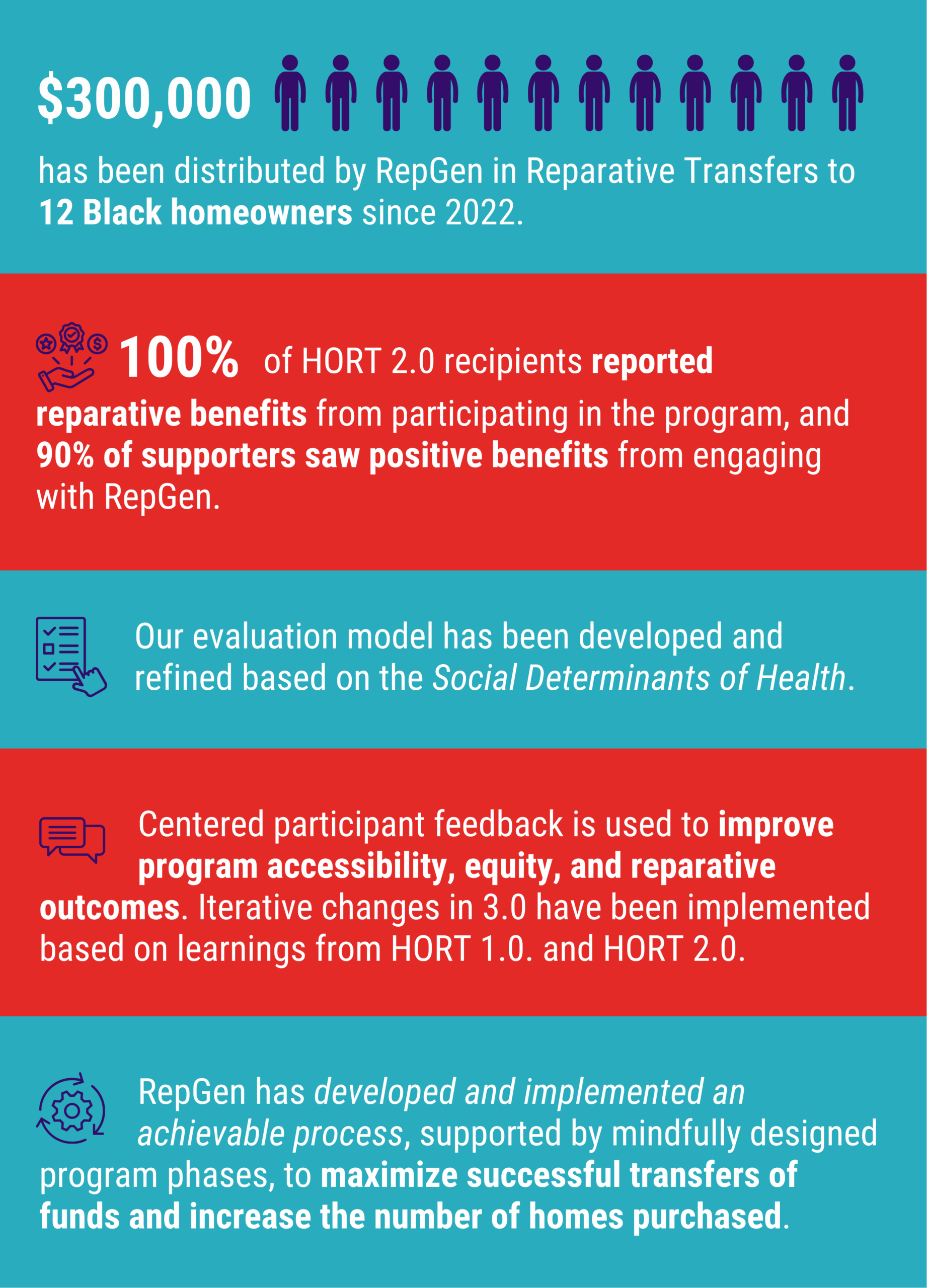While federal Reparations remain our long-term goal, Reparation Generation (RepGen) is acting now to demonstrate what real repair can look like in people’s lives today. The HORT Program is one of RepGen’s flagship models, providing one-time, $25,000 Reparative Transfers, homebuyer mentorship, Restorative Genealogy and other critical support to Black Descendants of Enslaved People in the U.S. purchasing a primary residence in Metro Detroit.
Grounded in the United Nations Reparations principle of compensation, the HORT Program aims to create replicable and scalable models that provide partial compensatory repair to Black Descendants of Enslaved People in the U.S.
Homeownership is the primary way most Americans build generational wealth. Yet, due to the legacy of slavery, redlining, discrimination in lending, and displacement, Black Americans have faced systemic exclusion from this pathway.
The evaluation findings from the HORT Program are shared to inform reparative program design nationally and generate evidence-based data demonstrating that reparative acts can heal harm, create wealth, and benefit recipients and contributors alike. By exemplifying that reparative acts work, we are bolstering the case for a Federal Reparations Program.
“Being able to purchase a house…was so out of reach until I heard about [the HORT Program]. And so it really did change our lives.”
“[In my new home] I’m around established neighborhood grocery stores…and I’m close to Eastern Market….I can look out my balcony over into the Dequindre cut where they have all types of events and concerts. It’s a lot more livelier than my old neighborhood.”
“Every part of the process was exciting. I mean, you know, how many people can say that they’re finding out about their genealogy, their lineage, as well as receiving $25,000 to help purchase a home?”
“[In my new home] I just have a certain level of peace that I didn’t have before.”
“It’s knowing that this house is always going to be ours. After, you know, my husband and I are gone, it’s going to be my daughter’s house.”
The HORT Program provides a pathway for American citizens who believe in Reparations and have benefited and/or caused harm to the Black community to transfer their wealth to Black Americans as acts of truth, healing, and repair. RepGen aggregates these wealth transfers and provides $25,000 Reparative Transfers (voluntary, non-recourse, non-repayable financial payments), homebuyer mentorship, and restorative genealogy consultations to Black Descendants of Enslaved People in the U.S who are pursuing homeownership. The Reparative Transfers can be used for down payment assistance and home related costs.
Following receipt of a Reparative Transfer, recipients are engaged in RepGen’s Reparative Evaluation process for two years to assess the impact of the Reparative Transfer on their lives. HORT contributors are also engaged in evaluation to assess the impact of making a Reparative Transfer.
Informed by two years of program evaluation and homeowner experiences, HORT 3.0 includes:
Applicants will:
Questions? Contact Karen Hughes, HORT 3.0 Program Manager, at [email protected].

RepGen recently initiated HORT 3.0 in Detroit and intends to provide $1 million in Reparative Transfers to 40 families by January 2027. Additionally, we would like to expand organizational capacity and program funding to test the HORT Program model in other municipalities. We believe it is important to show that our model can work in a variety of geographies and are open to conversations with interested parties as we actively pursue expansion.
Sign up for updates via the RepGen Newsletter or contribute today.